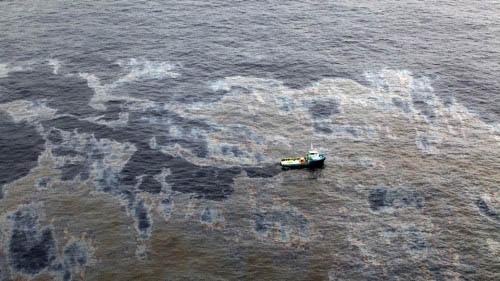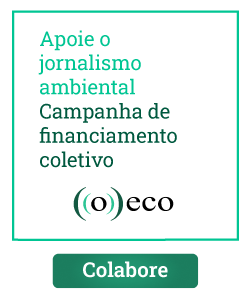 |
The government has committed $1bn of taxpayer’s funds to support deep-sea drilling in the south Atlantic, despite acknowledging that the controversial project has “significant potential” to damage the environment.
Vince Cable’s export credit guarantee department (ECGD) has agreed a $1bn (£637m) line of credit to help Brazil’s state-owned oil company, Petrobras, drill for oil and gas. This will be in deeper water than the area in the Gulf of Mexico where an explosion on BP’s Deepwater Horizon rig led to 11 deaths and US’s the worst environmental disaster two years ago.
The funding agreement, revealed in the ECGD’s annual report, comes despite the department’s own advisers warning that fresh oil and gas drilling off the coast of Brazil could lead to a marine catastrophe. The government’s experts warned there are “significant potential adverse environmental impacts anticipated, including beyond site boundaries”.
Lisa Nandy, a Labour MP and chair of a parliamentary inquiry into the ECGD, which the Department for Business has renamed UK Export Finance (UKEF), said: “It is a cause of real concern that, despite the coalition commitment to end all export finance for dirty fossil fuels, particularly the risky Atlantic oil drilling, UKEF still funds so many fossil-fuel-related projects and has so far failed to support a single green energy project.”
UKEF, which has been dubbed the “department for dodgy deals” by the Jubilee Debt Campaign, is designed to help British companies obtain insurance and credit to help them export goods overseas when traditional lenders may be afraid to provide financing. But the government was unable to name any British companies that would benefit from the $1bn credit line supplied to Petrobras.
A spokesman for the business department said: “At the time the annual report was published, no exports had been supported under the line of credit. UKEF hopes to be able to announce the first exports supported shortly.”
It is expected that FTSE 100 exploration company BG Group is likely to be one of the main British beneficiaries of the credit line. BG has placed ultra-deepwater drilling off the coast of Brazil at the heart of its ambitious strategy and it is actively developing many sites in partnership with Petrobras. A BG spokesman said the company had not yet received any UKEF financing for its projects in Brazil.
Petrobras, which is controlled by the Brazilian government, is in the midst of a $236.5bn investment plan to exploit the untapped oil and gas reserves in the south Atlantic. The company, which made profits of 77bn reais (£24bn) last year, hopes the new wells will help lift its production to 5.7m barrels a day by 2020.
The funding for Petrobras’s drilling was one of several environmentally questionable global projects that UKEF helped get off the ground last year. While the Petrobras deal was assessed by environmental experts, several funding deals were cleared without any safety checks, including £6m for a Chinese nuclear power plant, £6m for a petrochemical plant in Azerbaijan, £6m for a gas plant in Nigeria and £13.5m towards two Russian coal mines.
Tim Jones, policy officer at the Jubilee Debt Campaign, said: “Whenever the UK government backs loans for exports, it should be assessing what impact those exports will have. Yet Vince Cable is supporting potentially damaging projects such as coal mines and methanol plants without his department showing any interest in how the money and exports will be used.”
Ruth Davis, chief policy adviser for Greenpeace UK, said: “The government’s energy policies are becoming a shambles. They’ve U-turned on their pledge to stop supporting dirty fossil fuel projects overseas, while undermining Britain’s renewables industry through anti-green rhetoric and poorly designed energy market reform proposals.
“It’s time David Cameron and Nick Clegg got a grip, and put their weight behind the low-carbon economy they both backed before the last election.”
The 2010 coalition agreement stated that UKEF would become a champion “for British companies that develop and export innovative green technologies around the world, instead of supporting investment in dirty fossil fuel energy production”.
A spokesman for the business department said: “UK Export Finance applies all applicable OECD agreements that apply to the operation of export credit agencies. These include those that relate to potential environmental, social and human rights impacts. Details of how UK Export Finance will apply the coalition commitment … are expected to be announced by ministers in due course.”
The annual report also revealed that £1.8bn, or 79%, of the total £2.3bn of loans backed by UKEF in the 2010-11 financial year went to support Airbus.
Other deals backed by the government included £680,000 for military vehicles in Turkey, £282,889 to help Libya buy British wallpaper and £504,000 worth of vodka packaging sent to Russia.
A parliamentary inquiry is currently examining ways to radically change the ECGD, which has led to hundreds of millions of pounds of taxpayers’ money being lent to help dictators build arsenals and facilitate environmental and human rights abuses.
Leia também

Borboletas e formigas: um ensaio sobre jardins e ciclos
A vida em comunidade envolve relações de cuidado, mas também conflitos, riscos e ambiguidades. A cooperação é fundamental, mas não significa harmonia perfeita. E, essa lógica não é exclusiva para o mundo dos insetos →

A esperada queda da SELIC e o maior ativo do século XXI
Nos territórios, onde as veias seguem abertas e pulsam o sangue e a alma das cidades e de seus habitantes, milhares de pessoas sofrem os efeitos das decisões sobre investimentos →

Funbio lança chamada para expansão de unidades de conservação municipais
Entidade convida instituições a apresentarem projetos para Unidades de Conservação (UCs) nos biomas Caatinga, Pampa e Pantanal; inscrições vão até 30 de março →







